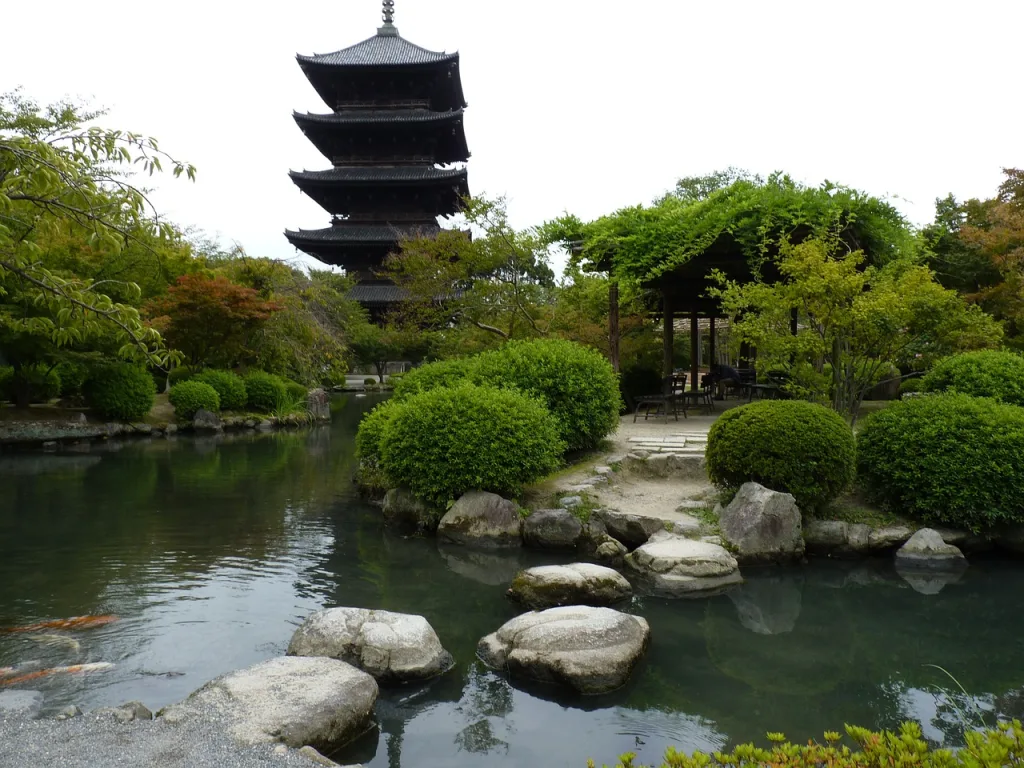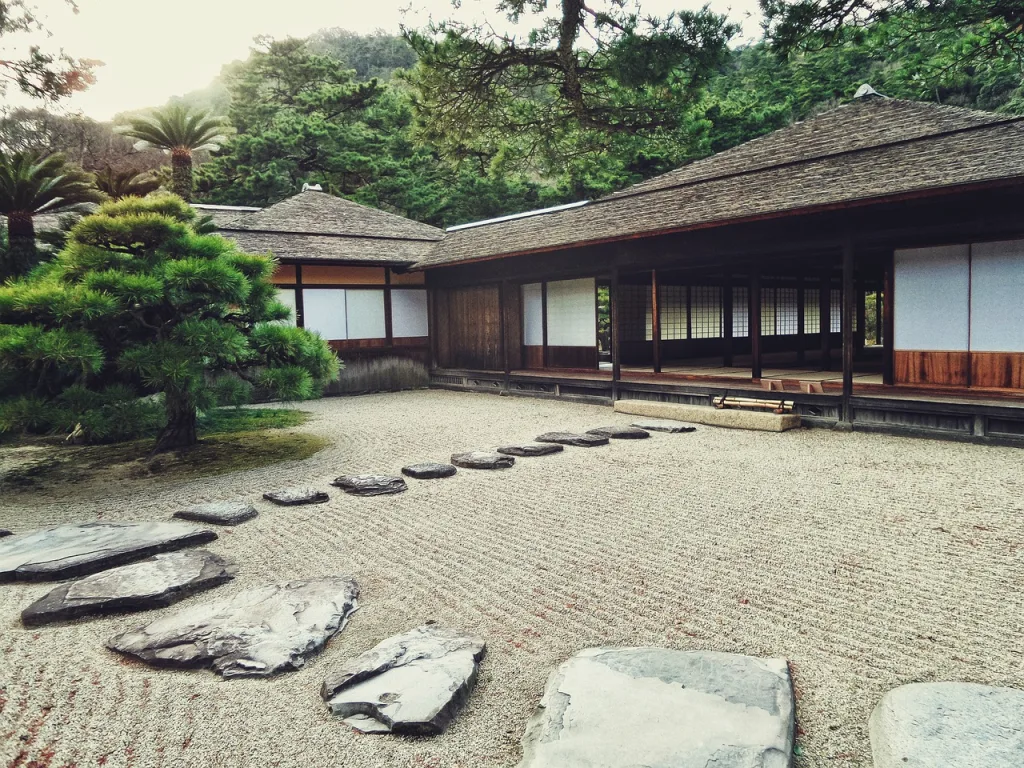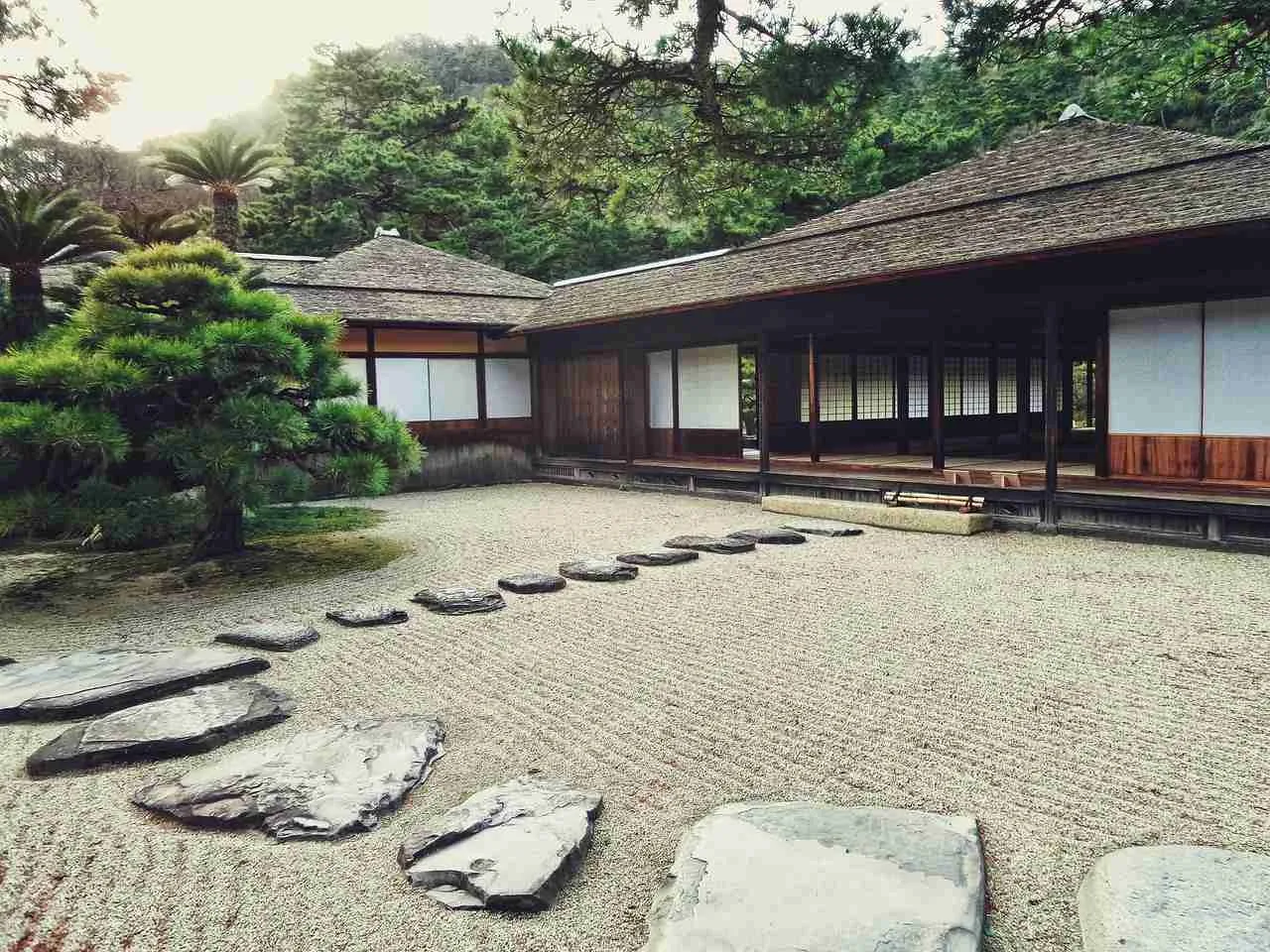Imagine stepping into a tranquil oasis, a place where your mind can find solace and your senses can unwind. A Zen garden, known for its simplicity and serenity, offers a sanctuary unlike any other. But what truly sets a Zen garden apart from all other landscapes? Is it the meticulously raked gravel, the meticulously placed rocks, or the meticulously trimmed plants? While each element plays a role in creating the overall aesthetic, the true defining feature of a Zen garden lies within its ability to evoke a sense of calm and tranquility within your soul. It is the harmonious blend of minimalist design, natural elements, and careful composition that creates an atmosphere that is both tranquil and inviting.
Understanding Zen Gardens
Zen gardens, also known as Japanese rock gardens or dry gardens, are serene and meditative spaces that have captivated people for centuries. These gardens originated in Japan and are deeply rooted in Zen Buddhism, serving as a means to promote tranquility and stimulate meditation. The art of Zen gardening has gradually spread to various parts of the world, influencing not only landscape design but also mental well-being. In this article, we will explore the origin, role, components, aesthetics, symbolism, maintenance, and even the impact of Zen gardens on mental health.
Origination of Zen Gardens
Zen gardens have their roots in Japan, dating back to the 8th century during the period of Heian Buddhism. They were initially developed as spaces for Buddhist monks to engage in meditation and find spiritual enlightenment. The origination of Zen gardens can be attributed to the influence of Chinese landscape painting styles, which emphasized the use of rocks, sand, and water to represent nature in its purest form. As Zen Buddhism gained popularity in Japan, so did the creation of these serene gardens, which eventually became an integral part of Japanese culture.
Role of Zen Gardens in Japanese Culture
The cultural significance of Zen gardens in Japan cannot be overstated. These gardens are considered sacred and are often found in temples, monasteries, and even private residences. They provide a place for individuals to disconnect from the chaos of daily life and reconnect with nature and themselves. Zen gardens serve as a reminder of the impermanence of life, urging individuals to embrace the present moment and find peace within. They are also associated with the tea ceremony, a traditional Japanese practice that promotes mindfulness and harmony. Through their role in Japanese culture, Zen gardens embody the essence of simplicity, tranquility, and introspection.
Significance of Zen Gardens in Zen Buddhism
Zen gardens are deeply intertwined with Zen Buddhism, a philosophy that emphasizes meditation and self-realization. These gardens are designed to represent abstract Zen principles, reflecting the harmonious balance between man-made elements and the natural world. The act of tending to a Zen garden is viewed as a form of mindfulness meditation, allowing individuals to cultivate presence and inner wisdom. The simplicity and minimalism of Zen gardens encourage contemplation and help practitioners detach from worldly distractions, enabling them to attain a state of enlightenment. In Zen Buddhism, a Zen garden serves as a visual representation of the mind and the path towards spiritual awakening.
Main Components of a Zen Garden
Rocks and Stones as a Dominant Element
One of the most prominent features of a Zen garden is the strategic arrangement of rocks and stones. These elements are carefully placed in specific patterns to create a sense of harmony and balance. Large rocks, known as “ishi,” are often positioned at the forefront of the garden, representing mountains or islands. They serve as focal points and help establish a sense of depth and perspective. Smaller stones, known as “tateishi,” are placed around the larger rocks to complement their presence while also symbolizing natural elements such as water or islands. The arrangement of rocks in a Zen garden is not purely aesthetic but also holds deep symbolic meaning, which we will explore further.
The Importance of Gravel or Sand
Gravel or sand is another essential component found in Zen gardens. It is used to create the distinctive raked patterns that evoke a sense of calmness and serenity. The gravel or sand represents water or an ocean, often referred to as “mizu-gumo” or “water clouds” in Japanese culture. The patterns created by raking the sand or gravel are not only visually pleasing but also promote focus and concentration. The act of raking is considered a meditative practice that allows individuals to clear their minds, removing any lingering thoughts or distractions. The simplicity of the gravel or sand exudes a sense of calmness and represents the fluidity and impermanence of life.
The Significance of Water Elements
In addition to rocks and gravel, water elements play a vital role in Zen gardens. These can range from small ponds or streams to even miniature waterfalls. Water exemplifies the transitory nature of existence, symbolizing the continuous flow of life and the ability to adapt to change. It is believed to have a soothing effect, bringing tranquility and refreshing energy to the garden. The sound of running water serves as a form of natural music, further enhancing the meditative atmosphere. Water elements also provide a habitat for various flora and fauna, adding to the overall harmony and balance of the garden.

Aesthetics of a Zen Garden
Minimalist Approach
One of the defining characteristics of a Zen garden is its minimalist approach. The simplicity and understated design aim to create a sense of tranquility and stillness. Unnecessary clutter or excessive ornamentation is avoided, allowing individuals to focus on the essence of the garden. Every element is carefully selected and placed, with each serving a specific purpose. The minimalist approach of Zen gardens encourages individuals to embrace simplicity in all aspects of life, fostering a sense of contentment and inner peace.
Japanese Wabi-Sabi Aesthetic
Zen gardens reflect the Japanese aesthetic known as “Wabi-Sabi.” This aesthetic philosophy celebrates the beauty of imperfection and impermanence. It embraces asymmetry, simplicity, and the natural cycle of growth and decay. In a Zen garden, the Wabi-Sabi aesthetic is embodied through the weathered appearance of rocks and the changing patterns of raked sand or gravel. This aesthetic concept encourages individuals to find beauty in the ordinary and appreciate the fleeting moments of life, reminding us of the impermanence of all things.
The Concept of ‘Ma’ or Negative Space
The concept of “Ma,” which translates to “negative space” or “emptiness,” is a fundamental element in Japanese art and design, including Zen gardens. It refers to the deliberate use of empty areas to create a sense of balance and serenity. The inclusion of empty spaces allows the mind to rest and appreciate the surrounding elements more deeply. In Zen gardens, negative space is often represented by the untouched areas of raked gravel or sand, providing moments of contemplation and stillness. The concept of ‘Ma’ underscores the belief that silence and emptiness are essential to fully appreciate the beauty and meaning in life.
Symbolism in Zen Gardens
Symbolism of Rocks and Stones
Rocks and stones hold profound symbolism in Zen gardens. They are not merely decorative elements, but embodiments of nature and its timeless essence. Large rocks represent stability, endurance, and the eternal nature of the universe. They evoke a sense of solidity and permanence, reminding individuals of the unchanging core within themselves. Smaller rocks symbolize movement and change, mirroring the constant fluctuations in life. Together, they represent the harmonious coexistence of stillness and flux, inviting contemplation on the ever-changing nature of reality.
Symbolism of Water Elements
Water elements in Zen gardens hold significant symbolism as well. Water symbolizes purification, renewal, and resilience. Its flowing nature represents the fluidity of life, constantly adapting and transforming. Water is also associated with clarity and the ability to perceive truth. In Zen gardens, the presence of water encourages individuals to let go of attachments, embrace change, and find inner peace amidst the ever-changing tides of existence.
Symbolism of Flora in Zen Gardens
While Zen gardens typically do not focus on extensive floral displays, the presence of carefully selected plants and shrubs holds symbolic meaning. These plants are chosen for their ability to harmonize with the overall aesthetic and evoke a sense of calmness. Evergreen plants, such as pine trees, represent longevity, resilience, and the ability to endure harsh conditions. Bamboo symbolizes flexibility and adaptability. Moss, which often thrives in Zen gardens, signifies age, tranquility, and a sense of calmness. Each plant chosen contributes to the overall symbolism and creates a cohesive visual representation of nature in equilibrium.

Maintenance and Care of Zen Gardens
Importance of Regular Raking
Regular raking is an essential aspect of maintaining a Zen garden. It not only ensures that the desired patterns in the gravel or sand are preserved but also promotes mindfulness and a connection with the present moment. Raking helps to clear debris and leaves, maintaining the clarity and serenity of the space. The repetitive motion of raking can have a soothing effect on the mind, allowing individuals to enter a meditative state during the process. By engaging in regular raking, the caretaker of a Zen garden becomes an active participant in its creation and maintenance.
Preserving the Natural Elements
Preserving the natural elements within a Zen garden is vital to maintaining its authentic beauty and symbolism. Regular inspection and care should be given to ensure the health and longevity of plants, particularly those chosen for their symbolic significance. Pruning, watering, and fertilizing are essential tasks in nurturing a garden that thrives harmoniously with nature. It is necessary to strike a balance between intervention and allowing natural processes to unfold. By respecting and nurturing the natural elements, a Zen garden can continue to inspire tranquility and introspection.
Seasonal Care and Considerations
Seasonal care is crucial for a Zen garden to flourish throughout the year. Depending on the climate, different plants and trees may require specific care during different seasons. For example, in colder regions, measures need to be taken to protect plants from harsh winter conditions. Throughout the year, it is important to pay attention to the changing needs of the garden, such as adjusting watering routines and ensuring proper drainage. Adapting to the seasons allows the Zen garden to continually evolve and reflect the ever-changing rhythms of nature.
Building Your Own Zen Garden
Choosing the Right Location
When building a Zen garden, choosing the right location is paramount. Ideally, it should be a calm and quiet space, away from distractions and noise. The garden should have ample sunlight and adequate drainage to support the growth of plants. Trees or structures that provide shade can also be strategically placed to create a sense of balance and provide relief from the sun. Additionally, considering the garden’s visibility and accessibility from different vantage points can enhance the overall experience.
Selecting the Right Components
Selecting the right components for your Zen garden is crucial to embody its essence. Carefully choose rocks and stones that resonate with the intended symbolism and flow of the garden. The size, shape, and texture of each stone should be considered. Gravel or sand should be chosen based on their ability to create harmonious patterns and evoke a sense of calmness. When selecting plant species, opt for those that thrive in your climate and are visually appealing without overpowering the simplicity of the garden. Strive for a cohesive and balanced composition of elements.
Maintenance and Upkeep of a Personal Zen Garden
Maintaining a personal Zen garden requires dedication and attention to detail. Regular raking should be practiced to uphold the patterns and serenity of the space. Plants should be nurtured, trimmed, and replanted as needed to ensure their health and longevity. Regular inspection and care help to identify and address any issues promptly. Periodically reassess the arrangement and composition of the garden, making adjustments and additions that enhance its overall harmony and symbolism. Remember to approach maintenance with mindfulness, treating it as an opportunity for personal reflection and meditation.

Influence of Zen Gardens on Modern Landscape Design
Incorporating Zen Principles into Modern Design
The influence of Zen gardens on modern landscape design is widespread and enduring. The principles of simplicity, balance, and harmony embodied by Zen gardens have become integral to contemporary designs. Elements such as rocks, carefully raked gravel or sand, and minimalist arrangements are often incorporated into various outdoor spaces. Modern designers draw inspiration from the spiritual and meditative qualities of Zen gardens, seeking to create environments that promote tranquility and connection with nature. The impact of Zen principles in modern design is a testament to the timeless appeal and relevance of these serene spaces.
Impact on Urban Spaces
In urban environments, the influence of Zen gardens can be seen in the creation of small-scale replicas or adaptations of traditional designs. These urban Zen gardens provide a sanctuary for city dwellers, offering a respite from the fast-paced and hectic nature of city living. Incorporating Zen elements into urban landscapes reminds individuals of the importance of mindfulness and finding moments of calmness amidst the chaos. They serve as reminders to slow down, breathe, and appreciate the beauty around us, even in the midst of bustling city life.
Sustainable Elements of Zen Gardens
Zen gardens inherently embody sustainable design practices by prioritizing simplicity, natural materials, and minimal environmental impact. The use of rocks, sand, and gravel reduces the need for water consumption compared to traditional gardens. The careful selection of plant species that thrive in specific climates reduces the need for excessive maintenance and water. Zen gardens often utilize natural materials that can be sourced locally, minimizing the carbon footprint associated with transportation. By embracing sustainable principles, Zen gardens inspire individuals to be mindful of their ecological impact and make choices that contribute to the well-being of the planet.
Zen Gardens around the World
Famous Zen Gardens in Japan
Japan is home to numerous famous Zen gardens that have captivated visitors for centuries. The Ryoan-ji Temple in Kyoto is renowned for its iconic Zen rock garden, consisting of fifteen carefully positioned rocks on a bed of raked white gravel. Karesansui gardens, such as the ones found in the Daisen-in and Tofuku-ji temples, showcase masterful interpretations of Zen aesthetics and symbolism. Each garden tells a unique story and invites contemplation and introspection. The gardens are often associated with historical and cultural significance, attracting tourists and Zen enthusiasts from around the world.
Noteworthy Zen Gardens outside Japan
While Zen gardens have their origins in Japan, their influence has extended far beyond its borders. Noteworthy Zen gardens can now be found in various countries, each offering its own interpretation and adaptation of the art form. The Portland Japanese Garden in the United States is widely recognized for its authentic representation of traditional Japanese garden design, including Zen gardens. The Tenryu-ji Temple in Kyoto, Japan served as inspiration for the Shisen-do Temple Garden in Kyoto, New Hampshire, where Zen principles are incorporated into a North American context. The ability of Zen gardens to transcend geographical and cultural boundaries is a testament to their universal appeal.
Contemporary Takes on Zen Gardens
In addition to traditional and historically significant Zen gardens, contemporary takes on these serene spaces have emerged in recent years. Modern designers and landscape architects have embraced the principles and aesthetics of Zen gardens, adapting them to suit different contexts and preferences. Contemporary Zen gardens may incorporate elements such as minimalist sculptures, innovative materials, and sustainable design practices. These reinterpretations of Zen gardens offer fresh perspectives on the art form, introducing new generations to its enduring beauty and relevance.
Zen Gardens and Mental Health
Using Zen Gardens for Stress Relief
Zen gardens have long been recognized for their ability to promote relaxation and alleviate stress. The meditative qualities of these gardens can be highly therapeutic, providing individuals with a means to unwind and find solace in the present moment. The act of tending to a Zen garden, such as raking the gravel or sand, can induce a calming effect on the mind, helping to reduce anxiety and promote a sense of clarity. The repetitive motions and focus required in the care of a Zen garden can act as a form of mindfulness practice, allowing individuals to temporarily detach from their worries and immerse themselves in the present experience.
Zen Gardens as a Form of Meditation
Zen gardens are often seen as an external manifestation of the inner journey towards peace and self-realization. The act of immersing oneself in the contemplation and care of a Zen garden can be viewed as a form of meditation. By engaging in the deliberate and mindful practice of tending to the garden, individuals create a space for introspection, self-reflection, and the cultivation of a calm and focused state of mind. Just as the carefully arranged elements in a Zen garden represent harmony and balance, the act of cultivating and caring for the garden reflects the internal cultivation of inner harmony and balance.
Scientific Studies on the Effects of Zen Gardens on Mental Health
Scientific studies have been conducted to explore the effects of Zen gardens on mental health and overall well-being. Research has shown that interactions with nature, even in the form of simulated or miniature landscapes like Zen gardens, can have a positive impact on psychological health. Studies have found that exposure to nature, including elements commonly found in Zen gardens such as rocks and water, can reduce stress levels, improve mood, and enhance cognitive function. Furthermore, the act of engaging in purposeful and mindful activities, such as tending to a Zen garden, has been linked to increased mindfulness, reduced anxiety, and improved subjective well-being.
Conclusion: The Most Defining Feature of a Zen Garden
Revisiting the main components, aesthetics, symbolism, maintenance, and influence of Zen gardens demonstrates that the most defining feature of a Zen garden is its ability to create a harmonious and transformative experience for individuals. The strategic arrangement of rocks, the simplicity of gravel or sand, and the symbolic presence of water elements all contribute to the serenity and meditative qualities of these gardens. The minimalistic approach and incorporation of Wabi-Sabi aesthetics and ‘Ma’ or negative space further enhance the tranquility and contemplative nature of these spaces.
Zen gardens have the power to transcend cultural boundaries and impact mental health positively. From their origination in Japan to their influence on modern landscape design and their contribution to stress relief and meditation, these gardens have a profound effect on individuals’ mindsets and overall well-being. The enduring appeal and relevance of Zen gardens lie in their reflection of the timeless qualities of nature and the human desire to find harmony and peace in a chaotic world. By connecting with the essence of Zen gardens, we can not only cultivate beautiful outdoor spaces but also nurture our minds and spirits.




